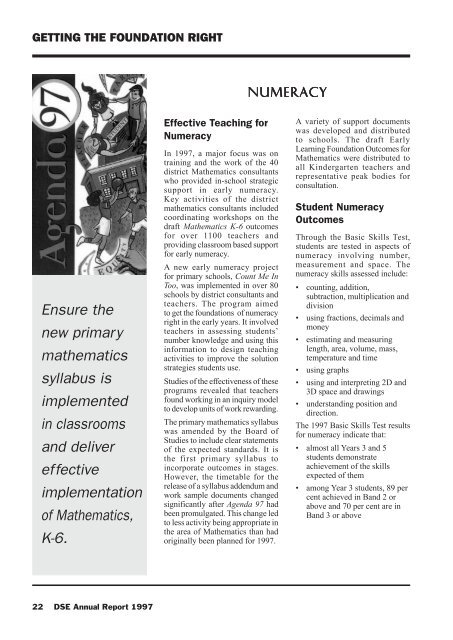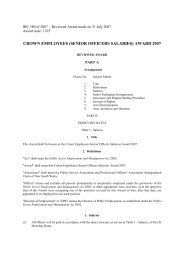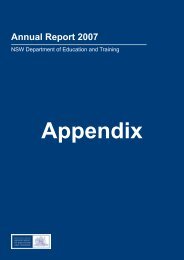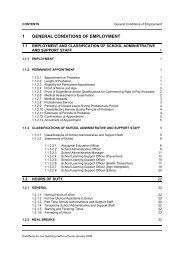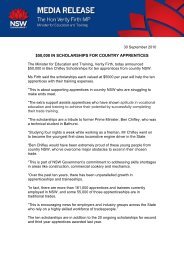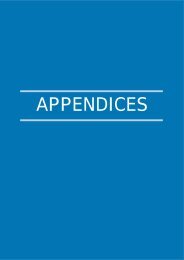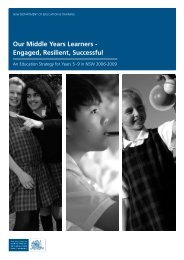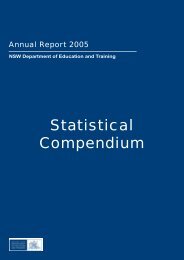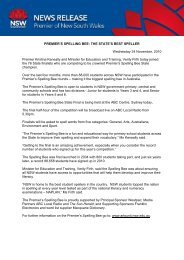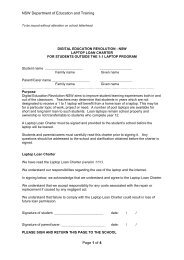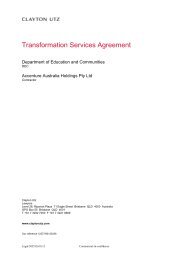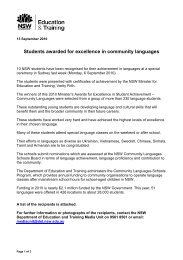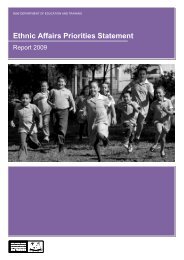01 - Department of Education and Communities - NSW Government
01 - Department of Education and Communities - NSW Government
01 - Department of Education and Communities - NSW Government
You also want an ePaper? Increase the reach of your titles
YUMPU automatically turns print PDFs into web optimized ePapers that Google loves.
GETTING THE FOUNDATION RIGHTNUMERACYEnsure thenew primarymathematicssyllabus isimplementedin classrooms<strong>and</strong> delivereffectiveimplementation<strong>of</strong> Mathematics,K-6.Effective Teaching forNumeracyIn 1997, a major focus was ontraining <strong>and</strong> the work <strong>of</strong> the 40district Mathematics consultantswho provided in-school strategicsupport in early numeracy.Key activities <strong>of</strong> the districtmathematics consultants includedcoordinating workshops on thedraft Mathematics K-6 outcomesfor over 1100 teachers <strong>and</strong>providing classroom based supportfor early numeracy.A new early numeracy projectfor primary schools, Count Me InToo, was implemented in over 80schools by district consultants <strong>and</strong>teachers. The program aimedto get the foundations <strong>of</strong> numeracyright in the early years. It involvedteachers in assessing students’number knowledge <strong>and</strong> using thisinformation to design teachingactivities to improve the solutionstrategies students use.Studies <strong>of</strong> the effectiveness <strong>of</strong> theseprograms revealed that teachersfound working in an inquiry modelto develop units <strong>of</strong> work rewarding.The primary mathematics syllabuswas amended by the Board <strong>of</strong>Studies to include clear statements<strong>of</strong> the expected st<strong>and</strong>ards. It isthe first primary syllabus toincorporate outcomes in stages.However, the timetable for therelease <strong>of</strong> a syllabus addendum <strong>and</strong>work sample documents changedsignificantly after Agenda 97 hadbeen promulgated. This change ledto less activity being appropriate inthe area <strong>of</strong> Mathematics than hadoriginally been planned for 1997.A variety <strong>of</strong> support documentswas developed <strong>and</strong> distributedto schools. The draft EarlyLearning Foundation Outcomes forMathematics were distributed toall Kindergarten teachers <strong>and</strong>representative peak bodies forconsultation.Student NumeracyOutcomesThrough the Basic Skills Test,students are tested in aspects <strong>of</strong>numeracy involving number,measurement <strong>and</strong> space. Thenumeracy skills assessed include:• counting, addition,subtraction, multiplication <strong>and</strong>division• using fractions, decimals <strong>and</strong>money• estimating <strong>and</strong> measuringlength, area, volume, mass,temperature <strong>and</strong> time• using graphs• using <strong>and</strong> interpreting 2D <strong>and</strong>3D space <strong>and</strong> drawings• underst<strong>and</strong>ing position <strong>and</strong>direction.The 1997 Basic Skills Test resultsfor numeracy indicate that:• almost all Years 3 <strong>and</strong> 5students demonstrateachievement <strong>of</strong> the skillsexpected <strong>of</strong> them• among Year 3 students, 89 percent achieved in B<strong>and</strong> 2 orabove <strong>and</strong> 70 per cent are inB<strong>and</strong> 3 or above22 DSE Annual Report 1997


